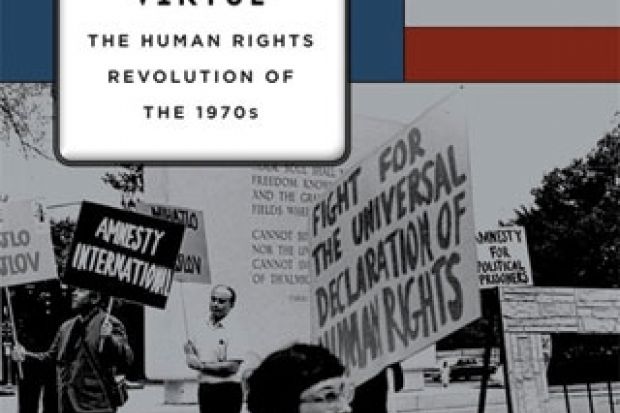Between the unveiling of the Universal Declaration of Human Rights in 1948 and the present, the subject of human rights has expanded greatly from a limited, if rhetorically powerful, vision of a post-war world order (with no means of implementation) to a fundamental aspect of US foreign policy, an influential non-governmental organisation lobby and a field of academic study. Barbara Keys’ Reclaiming American Virtue: The Human Rights Revolution of the 1970s is a vigorous and engaging account of the emergence of the concept and its non-linear journey from lip-serving political piety to an integral, if contradictory, component of the foreign policy of the US. Central to her story is the Vietnam War and its domination of American politics for more than a decade. In its aftermath, human rights served as a means of cleansing the body politic for both liberals and conservatives.
Given its current ubiquity, what is most surprising in Keys’ history is how little purchase human rights had on the imagination of Americans until the mid-1970s. Nor was there an easy and automatic connection between the struggle for civil rights domestically and a concern for human rights internationally. “When the new movement came,” she writes, “it would be less about extending the battles of the sixties than declaring them over and searching for foreign rather than homegrown monsters to slay.”
The monsters were, of course, legion, although they differed according to one’s politics. For those who wished to block détente and extend the Cold War indefinitely, the Soviet Union’s violation of the rights of Jews to emigrate was the perfect issue, joining a defence of human rights with an ongoing effort to block closer US-Soviet relations. For liberals, on the other hand, American aid to right-wing regimes served a similar function. Each political persuasion worked to move the country beyond Vietnam, conservatives asserting and acting on their belief in America the Good; liberals acknowledging and hoping to atone for America the Guilty. Among the strengths of this book is its account of the origin and slow growth of the American branch of Amnesty International, including an important discussion of both its efficacy and its limitations. Keys offers an equally interesting account of the founding of Amnesty’s rival organisation, Human Rights Watch.
She charts in considerable detail the role that a political appeal to human rights played in post-Vietnam elections. Its growing usefulness is perhaps best illustrated by Henry Kissinger’s scornful rejection of the notion when he was Richard Nixon’s Secretary of State, and his later embrace of the issue when he held the same post under Gerald Ford. Under Jimmy Carter, an appeal to human rights became central to US foreign policy. “Human rights resonated because it satisfied the public’s emotional craving to move beyond the moral taint of the war…In the new president’s hands, human rights functioned to absolve sin.” It was less clear how a human rights agenda might apply in specific foreign policy decisions. In the words of one Carter administration official: “No one knows what the policy is, yet it pervades everything we do.”
The problem of reconciling the pursuit of human rights with perceived American security interests divided the Carter administration, pitting Richard Holbrooke, assistant secretary of state for East Asian and Pacific affairs, against Patricia Derian, the head of the department’s Bureau of Human Rights, who was elevated to assistant secretary of state status – a battle Holbrooke won. Keys notes that the major officials involved in human rights were an African American (Andrew Young, ambassador to the United Nations) and two women (Derian and Jessica Tuchman), a sure indication of its low status in the administration’s list of priorities.
Keys suggests that the successes of Carter’s human rights efforts were mixed: they had a positive effect in terms of easing political repression in Argentina, for example, but were irrelevant to the larger social and economic issues plaguing Latin America. But a focus on human rights failed in terms of uniting the Democratic Party, whose conservative wing remained firmly focused on the Soviet bloc while liberals were more interested in violations in Iran and the Philippines, where US security interests actually conflicted with a human rights agenda. At the same time, for Carter, “human rights were about being proud again, standing tall, feeling good”. The president had, he observed, “merely tapped into what was already ‘part of the consciousness of the free people of the greatest nation on Earth, the United States’ ”. Goodbye, Vietnam.
In a concluding chapter, Keys briefly covers the post-Cold War and post-9/11 trajectory of the policy and argues that human rights replaced what had been the mainstay of US foreign policy from the 1950s forward: modernisation theory. Advocates of systematic efforts to guide and help develop what used to be called the Third World, chastened by Vietnam, turned to more modest approaches to the alleviation of suffering worldwide. Keys’ response to this shift is surprisingly ambivalent. For all its hubris, its often implicit racism and its neo-imperialist echoes, modernisation theory “arguably offered a more empowering vision for the rest of the world than the minimalist creed of the 1970s”. Mostly the embrace of human rights was directed as much at making Americans “feel good” as at doing good in the world. It functioned as a “psychic salve that helped the nation avoid a true reckoning with Vietnam”, Keys suggests, with consequences that “have yet to be plumbed”.
Reclaiming American Virtue: The Human Rights Revolution of the 1970s
By Barbara J. Keys
Harvard University Press, 368pp, £22.95
ISBN 9780674724853
Published February 2014





